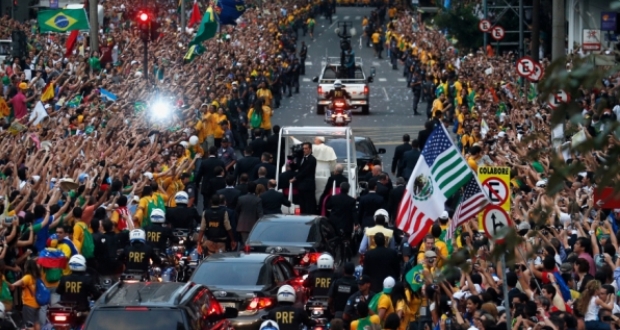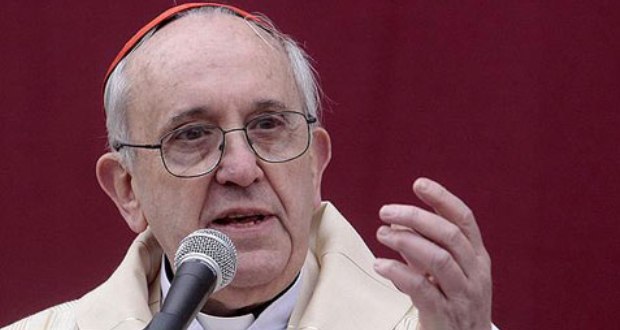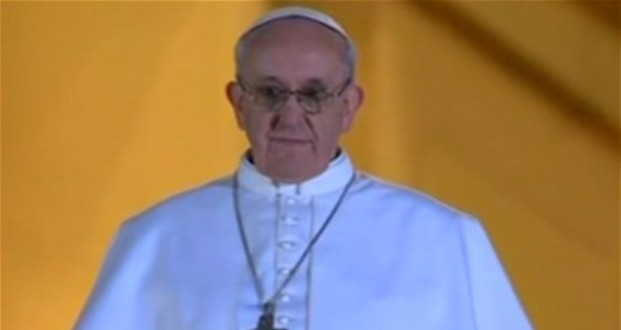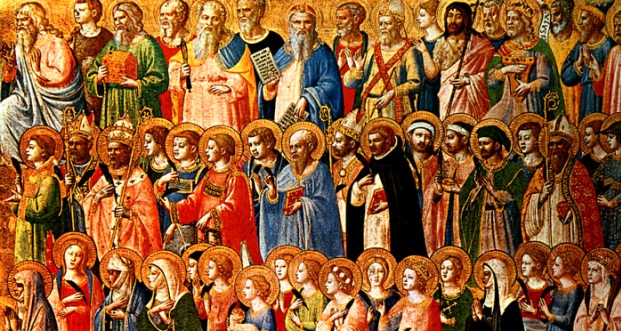World Youth Day 2013 – Pope Francis To Bishops

Below is an English translation of Pope Francis’ address to Bishops in Brazil – the occasion being the 28th World Youth Day held in Brazil. Also provided is an audio file that you can listen to or download at your convenience.
Dear Brothers,.
How great it is to be here with you, the Bishops of Brazil!
Thank you for coming, and please enable me to speak with you as one among friends. That’s why I choose to talk to you in Spanish, so as to express better exactly what I carry in my heart. I ask you to forgive me.
[simpleazon-image align=”left” asin=”1586175165″ locale=”us” height=”375″ src=”http://ecx.images-amazon.com/images/I/31ybs9z9ZDL.jpg” width=”229″]We are satisfying somewhat apart, in this place prepared by our brother, Archbishop Orani Tempesta, so that we can be alone and talk with one another from the heart, as priests to whom God has actually entrusted his flock. On the streets of Rio, youths from all over the world and many others await us, needing to be reached by the merciful gaze of Christ the Good Shepherd, whom we are called to make present. So let us enjoy this moment of repose, exchange of ideas and genuine fraternity.
Beginning with the President of the Episcopal Conference and the Archbishop of Rio de Janeiro, I wish to embrace each and every one of you, and in a particular way the Emeritus Bishops. More than a formal address, I would such as to share some reflections with you.
The first came to mind when I went to the shrine of Aparecida. There, at the foot of the statue of the Immaculate Conception, I prayed for you, your Churches, your ladies, guys and priests religious, seminarians, laity and their households and, in a particular method, the young people and the elderly: these last are the hope of a nation; the young, since they bring strength, idealism and wish for the future; the senior since they represent the memory, the wisdom of the people.1.
1. Aparecida: a trick for translating the Church’s objective In Aparecida God offered Brazil his own Mother. In Aparecida God likewise provided a lesson about himself, about his way of being and acting. A lesson about the humbleness which is among God’s essential features, part of God’s DNA. Aparecida offers us a perennial teaching about God and about the Church; a teaching which neither the Church in Brazil nor the country itself should forget.
At the start of the Aparecida event, there were poor fishermen trying to find food. Much cravings and so few resources. People constantly require bread. Individuals always begin with their requirements, even today.
They have a worn out, ill-fitted watercraft; their nets are old and maybe torn, inadequate. Comes the effort, possibly the weariness, of the catch, yet the outcomes are imperceptible: a failure, time squandered. For all their work, the webs are empty.
When God wills it, he mysteriously enters the scene. The waters are deep and yet they always cover the possibility of a revelation of God. He appeared out of the blue, maybe when he was not expected. The patience of those who await him is always checked. And God showed up in a novel style, because he can constantly transform himself: as a breakable clay statuary, darkened by the waters of the river and aged by the passage of time. God always enters clothed in poverty, littleness.
Then there is the statuary itself of the Immaculate Conception. The body appeared, then the head, then the head was signed up with to the body: unity. What had been broken is recovered and becomes one. Colonial Brazil had actually been divided by the shameful wall of slavery. Our Lady of Aparecida appears with a black face, initially separated, and then joined in the hands of the fishermen.
Below there is an enduring message which God wants to teach us. His own appeal, mirrored in his Mother conceived without original sin, arises from the darkness of the river. In Aparecida, from the beginning, God’s message was one of recovering exactly what was broken, reuniting what had actually been divided. Walls, voids, differences which still exist today are destined to vanish. The Church can not disregard this lesson: she is called to be a means of settlement.
The fishermen do not dismiss the secret run into in the river, even if it is a secret which appears insufficient. They do not throw away the pieces of the secret. They await its conclusion. And this does not take long to come. There is a wisdom here that we require to discover. There are pieces of the secret, like the stones of a mosaic, which we encounter, which we see. We are impatient, distressed to see the whole picture, however God lets us see things gradually, silently. The Church likewise needs to discover ways to wait.
Then the fishermen bring the mystery home. Ordinary people always have room to absorb the secret. Possibly we have actually decreased our method of discussing mystery to logical explanations; but for ordinary people the secret gets in with the heart. In the houses of the poor, God constantly discovers a location.
[simpleazon-image align=”right” asin=”1599821605″ locale=”us” height=”375″ src=”http://ecx.images-amazon.com/images/I/51Ti54loFpL.jpg” width=”258″]The fishermen “wrap” the mystery, they clothe the Virgin drawn from the waters as if she were cold and required to be warmed. God asks for shelter in the warmest part of ourselves: our heart. God himself releases the heat we require, but first he enters like a wise beggar. The fishermen cover the mystery of the Virgin with the lowly mantle of their faith. They call their next-door neighbors to see its rediscovered charm; they all collect around and relate their troubles in its presence and they entrust their causes to it. In this way they make it possible for God’s plan to be accomplished: first comes one grace, then an additional; one grace leads to an additional; one grace gets ready for an additional. God slowly unfolds the mysterious humility of his power.
There is much we can profit from the approach of the fishermen. About a Church makings room for God’s mystery; a Church which nurtures that secret in such a way that it can entice people, attract them. Only the beauty of God can bring in. God’s means is through temptation, attraction. God lets himself be brought home. He awakens in us a desire to keep him and his life in our houses, in our hearts. He reawakens in us a need to call our next-door neighbors in order to make known his appeal. Goal is born precisely from this divine allure, by this awe born of encounter. We mention goal, about a missionary Church. I think about those fishermen calling their neighbors to see the mystery of the Virgin. Without the simplicity of their method, our goal is destined failure.
The Church requires continuously to relearn the lesson of Aparecida; she must not lose sight of it. The Church’s webs are weak, perhaps patched; the Church’s barque is not as effective as the great transatlantic liners which cross the ocean. But God wants to be seen exactly with our resources, scanty resources, due to the fact that he is always the one who acts.
Dear brothers, the outcomes of our pastoral work do not depend on a wealth of resources, but on the creativity of love. To be sure, willpower, effort, hard work, planning and company all have their place, but first and foremost we require to realize that the Church’s power does not reside in herself; it is hidden in the deep waters of God, into which she is called to cast her nets.
An additional lesson which the Church must regularly recall is that she can not leave simplicity behind; otherwise she forgets ways to speak the language of Mystery. Not only does she herself remain outside the door of the mystery, however she proves incapable of approaching those who aim to the Church for something which they themselves can not offer, namely, God himself. Sometimes we lose people because they don’t comprehend exactly what we are saying, since we have forgotten the language of simplicity and import an intellectualism foreign to our individuals. Without the grammar of simpleness, the Church loses the very conditions making it possible “to fish” for God in the deep waters of his Mystery.
A last idea: Aparecida happened at a crossroads. The roadway which linked Rio, the capital, with Sa ~ o Paulo, the clever province then being born, and Minas Gerais, the mines wanted by the courts of Europe, was a major intersection in colonial Brazil. God appears at the crossroads. The Church in Brazil can not forget this calling which was present from the moment of her birth: to be a beating heart, to gather and to spread.
2. Appreciation for the path taken by the Church in Brazil The Bishops of Rome have constantly had an unique location in their heart for Brazil and its Church. A wonderful journey has actually been completed. From twelve dioceses throughout the First Vatican Council, it now numbers 275 circumscriptions. This was not the growth of a company or an organization venture, but rather the dynamism of the Gospel tale of the “5 loaves and 2 fish” which, through the bounty of the Father and with tireless labor, bore plentiful fruit.
Today I would like to acknowledge your unsparing work as priests in your neighborhood Churches. I think about Bishops in the forests, taking a trip up and down rivers, in semiarid locations, in the Pantanal, in the pampas, in the metropolitan jungles of your sprawling cities. Always like your flock with complete dedication! I also think about all those names and deals with which have indelibly marked the journey of the Church in Brazil, making palpable the Lord’s enormous bounty to this Church.2.
The Bishops of Rome were never ever far-off; they followed, supported this journey and urged. In current decades, Blessed John XXIII urged the Brazilian Bishops to prepare their first pastoral strategy and, from that starting an authentic pastoral custom occurred in Brazil, one which prevented the Church from drifting and offered it with a sure compass. The Servant of God Paul VI motivated the reception of the Second Vatican Council not just in fidelity but likewise in imagination (cf. the CELAM General Assembly in Medellin), and decisively affected the self-identity of the Church in Brazil with the Synod on evangelization which standard point of reference which is the Apostolic Exhortation Evangelii Nuntiandi. Blessed John Paul II saw Brazil three times, fluctuating the nation, from north to south, emphasizing the Church’s pastoral objective, communion and participation, preparation for the Great Jubilee and the new evangelization. Benedict XVI selected Aparecida as the site of the Fifth CELAM General Assembly and this left a profound mark on the Church of the whole continent. The Church in Brazil welcomed and creatively applied the Second Vatican Council, and the course it has taken, though requiring to overcome some teething issues, has brought about a Church slowly more mature, open, missionary and charitable.
Today, times have actually changed. As the Aparecida file well put it: ours is not an age of modification, but a change of age. Today we urgently need to keep putting the concern: exactly what is it that God is asking of us? I would now like to sketch a few concepts by way of a response.
3. The icon of Emmaus as a secret for interpreting the present and the future Before all else, we must not yield to the concern when expressed by Blessed John Henry Newman: “… the Christian world is slowly ending up being effete and unproductive, as land which has actually been exercised and is become sand”.3.
We must not accept discouragement, grievance and disillusionment. We have labored significantly and, sometimes, we see what appear to be failures. We seem like those who needs to tally up a losing season as we think about those who have actually left us or not consider us reliable or relevant. Let us check out once again, in this light, the story of Emmaus (cf. Lk 24:13 -15). The two disciples have actually left Jerusalem. They are leaving behind the “nakedness” of God. They are scandalized by the failure of the Messiah in whom they had actually hoped and who now appeared thoroughly vanquished, humiliated, even after the 3rd day (vv. 17-21). Right here we have to deal with the tough secret of those people who leave the Church, who, under the illusion of alternative ideas, now think that the Church– their Jerusalem– can not provide them anything meaningful and important. So they set off on the road alone, with their frustration. Maybe the Church appeared too weak, perhaps too distant from their needs, perhaps too inadequate to respond to their concerns, maybe too cold, possibly too caught up with itself, possibly a prisoner of its own stiff solutions, perhaps the world appears to have actually made the Church a relic of the past, unfit for new concerns; maybe the Church could talk to individuals in their infancy however not to those come of age.4 It is a truth that nowadays there are many people like the two disciples of Emmaus; not just those searching for answers in the brand-new religious teams that are sprouting up, but likewise those who currently seem godless, both in theory and in practice.
Confronted with this circumstance, what are we to do?
We need a Church unafraid of going forth into their night. We require a Church efficient in fulfilling them on their means. We require a Church capable of entering into their conversation. We need a Church able to discussion with those disciples who, having actually left Jerusalem behind, are wandering aimlessly, alone, with their own frustration, disappointed by a Christianity now thought about barren, fruitless soil, incapable of producing meaning.
A ruthless procedure of globalization, a frequently unrestrained procedure of urbanization, have actually guaranteed terrific things. Many people have actually been astounded by the capacity of globalization, which naturally does include positive aspects. Many likewise totally neglect its darker side: the loss of a sense of life’s meaning, individual dissolution, a loss of the experience of belonging to any “nest” whatsoever, ruthless however subtle violence, the inner fragmentation and break up of households, loneliness and desertion, divisions, and the incapability to enjoy, to forgive, to understand, the inner toxin which makes life a hell, the demand for affection because of feelings of insufficiency and unhappiness, the fallen short effort to find a response in drugs, liquor, and sex, which only become further prisons.
Numerous, too, have looked for faster ways, for the requirements set by Mother Church appear to be asking too much. Lots of people think: “the Church’s idea of man is too soaring for me, the perfect of life which she proposes is past my capabilities, the objective she sets is unattainable, past my reach. — they continue– I can not live without having at least something, even a bad imitation, of exactly what is too lofty for me, exactly what I can not manage. With disappointed hearts, they then go off in search of somebody who will lead them even further astray.
The wonderful sense of abandonment and solitude, of not even belonging to oneself, which frequently results from this scenario, is too painful to conceal. Some kind of launch is necessary. There is constantly the choice of whining: however did we get to this point? But even problem acts like a boomerang; it returns and ends up increasing one’s unhappiness. Couple of individuals are still capable of hearing the voice of discomfort; the best we can do is to anaesthetize it.
[simpleazon-image align=”right” asin=”1586177036″ locale=”us” height=”375″ src=”http://ecx.images-amazon.com/images/I/31sUGY7P2XL.jpg” width=”227″]Today, we require a Church efficient in walking at people’s side, of doing more than merely paying attention to them; a Church which accompanies them on their quest; a Church able to understand the “evening” contained in the air travel of numerous of our brothers and sisters from Jerusalem; a Church which realizes that the reasons why people leave likewise contain reasons they can at some point return. We need to know how to translate, with nerve, the bigger photo.
I would like all of us to ask ourselves today: are we still a Church efficient in warming hearts? A Church capable of leading people back to Jerusalem? Of bringing them house? Jerusalem is where our roots are: Scripture, catechesis, sacraments, community, relationship with the Lord, Mary and the apostles … Are we still able to mention these roots in a manner that will revive a sense of wonder at their appeal?
Lots of people have left due to the fact that they were promised something more towering, more effective, and much faster.
Exactly what is more soaring than the love exposed in Jerusalem? Nothing is more soaring than the abasement of the Cross, since there we truly approach the height of love! Are we still capable of demonstrating this truth to those who think that the apex of life is to be found somewhere else? appeal?
Do we understand anything more powerful than the strength concealed within the weak point of love, goodness, reality and individuals today are drawn in by things that are quicker and much faster: fast Internet connections, fast cars and aircrafts, instant relationships. But at the same time we see a desperate requirement for calmness, I would even state slowness. Is the Church still able to move slowly: to make the effort to listen, to have the perseverance to reassemble and fix? Or is the Church herself caught up in the frantic pursuit of efficiency? Dear brothers, let us recover the calm to be able to walk at the same pace as our pilgrims, keeping alongside them, staying close to them, enabling them to speak of the disappointments present in their hearts and to let us address them. They desire to forget Jerusalem, where they have their sources, but eventually they will experience thirst. We need a Church capable of accompanying them on the road back to Jerusalem! A Church capable of helping them to rediscover the remarkable and cheerful things that are spoken of Jerusalem, and to understand that she is my Mother, our Mother, and that we are not orphans! We were born in her. Where is our Jerusalem, where were we born? In Baptism, in the first encounter of love, in our calling, in occupation.5.
We need a Church efficient in recovering citizenship to her lots of kids who are journeying, as it were, in an exodus.
4. Challenges dealing with the Church in Brazil In the light of what I have stated above, I would like to emphasize a number of obstacles dealing with the precious Church in Brazil.
Formation as a concern: Bishops, priests, religious, laity.
Dear brothers, unless we train ministers capable of warming people’s hearts, of walking with them in the night, of dialoguing with their hopes and disappointments, of mending their brokenness, what hope can we have for our present and future journey? It isn’t true that God’s presence has been dimmed in them. Let us learn to look at things more deeply. What is missing is someone to warm their heart, as was the case with the disciples of Emmaus (cf. Lk 24:32).
That is why it is very important to create and ensure an ideal formation, one which will offer persons able to step into the night without being conquered by the darkness and losing their bearings; able to pay attention to people’s dreams without being seduced and to share their disappointments without losing hope and becoming bitter; able to sympathize with the brokenness of others without losing their own strength and identification.
What is needed is a solid human, cultural, effective, spiritual and doctrinal formation.6 Dear brother Bishops, nerve is required to undertake a profound testimonial of the structures in place for the development and preparation of the clergy and the laity of the Church in Brazil. It is inadequate that development be thought about a vague priority, either in papers or at meetings. What is needed is the practical wisdom to set up lasting educational structures on the local, national and regional levels and to take them to heart as Bishops, without sparing energy, concern and personal interest. The present situation calls for quality formation at every level. Bishops may not delegate this task. You can not delegate this task, however must embrace it as something fundamental for the trip of your Churches.
Collegiality and solidarity in the Episcopal Conference.
The Church in Brazil needs more than a national leader; it needs a network of local “testaments” which talk the same language and in every location ensure not unanimity, but true unity in the exuberance of diversity.
Communion is a fabric to be woven with patience and perseverance, one which gradually “draws together the stitches” to make a more extensive and thick cover. A threadbare cover will not provide warmth.
It is very important to remember Aparecida, the method of gathering diversity together. Not so much a variety of ideas in order to produce a document, but a selection of experiences of God, in order to set a crucial procedure in movement.
The disciples of Emmaus went back to Jerusalem, recounting their experience of meeting the risen Christ. There they came to know other manifestations of the Lord and the experiences of their brothers and sisters. The Episcopal Conference is precisely a vital space for enabling such an exchange of testimonies about encounters with the Risen One, in the north, in the south, in the west … There is need, then, for a greater appreciation of regional and regional elements. Central bureaucracy is not sufficient; there is also a requirement for increased collegiality and solidarity. This will be a source of true enrichment for all.7.
Long-lasting state of mission and pastoral conversion.
[simpleazon-image align=”left” asin=”145387500X” locale=”us” height=”375″ src=”http://ecx.images-amazon.com/images/I/51GpF7wTaTL.jpg” width=”229″]Aparecida discussed a permanent state of mission8 and of the need for pastoral conversion.9 These are 2 important results of that Assembly for the entire Church in the area, and the progress made in Brazil on these two points has been significant.
Concerning mission, we need to remember that its urgency derives from its inner motivation; in other words, it is about handing on a legacy. As for method, it is essential to realize that a legacy is about witness, it resembles the baton in a relay race: you don’t throw it up in the air for whoever has the ability to catch it, so that anyone who doesn’t catch it has to manage without. In order to transmit a legacy, one needs to hand it over personally, to touch the one to whom one wants to give, to relay, this inheritance.
Concerning pastoral conversion, I would like to recall that “pastoral care” is nothing other than the exercise of the Church’s motherhood. She gives birth, suckles, gives growth, corrects, nourishes and leads by the hand … So we need a Church capable of rediscovering the maternal womb of mercy. Without mercy we have little chance nowadays of becoming part of a world of “wounded” persons in need of understanding, forgiveness, love.
In mission, also on a continental level,10 it is very important to reaffirm the family, which remains the essential cell of society and the Church; young people, who are the face of the Church’s future; women, who play a fundamental role in passing on the faith. Let us not reduce the participation of females in the Church, however instead advertise their active role in the ecclesial community. By losing females, the Church threats ending up being sterile.
The task of the Church in society.
In the context of society, there is only one thing which the Church quite clearly demands: the freedom to proclaim the Gospel in its entirety, even when it runs counter to the world, even when it breaks the tide. In so doing, she defends treasures of which she is merely the custodian, and values which she does not produce but rather receives, to which she must stay faithful.
The Church claims the right to serve man in his wholeness, and to talk of what God has actually revealed about human beings and their fulfilment. The Church wishes to make present that spiritual patrimony without which society falls apart and cities are overwhelmed by their own walls, pits, barriers. The Church has the duty and the right to keep alive the flame of human freedom and unity.
Education, health, social harmony are pressing concerns in Brazil. The Church has a word to say on these issues, because any adequate response to these challenges requires more than merely technical solutions; there needs to be a hidden view of guy, his freedom, his value, his openness to the transcendent. Dear brother Bishops, do not be afraid to offer this contribution of the Church, which benefits society as a whole.
The Amazon Basin as a litmus test for Church and society in Brazil.
There is one final point on which I would like to dwell, which I consider appropriate for the present and future journey not just of the Brazilian Church but of the whole society, namely, the Amazon Basin. The Church’s presence in the Amazon Basin is not that of somebody with bags packed and prepared to leave after having exploited everything possible. The Church has actually been present in the Amazon Basin from the beginning, in her missionaries and religious congregations, and she is crucial and still present to the area’s future. I think of the welcome which the Church in the Amazon Basin is offering even today to Haitian immigrants following the terrible earthquake which shook their country.
I would like to invite everyone to reflect on what Aparecida said about the Amazon Basin,11 its forceful appeal for respect and protection of the entire creation which God has entrusted to man, not so that it be indiscriminately exploited, but rather made into a garden. In considering the pastoral challenge represented by the Amazon Basin, I have to reveal my thanks for all that the Church in Brazil is doing: the Episcopal Commission for the Amazon Basin established in 1997 has already proved its effectiveness and many dioceses have responded readily and generously to the appeal for solidarity by sending lay and priestly missionaries. I think Archbishop Jaime Chemelo, a pioneer in this effort, and Cardinal Hummes, the current President of the Commission. I would add that the Church’s work needs to be more encouraged and introduced afresh. There is a need for quality formators, specifically teachers of theology, for combining the results attained in the area of training a native clergy and providing priests suited to local conditions and committed to consolidating, as it were, the Church’s “Amazonian face”.
Dear brother Bishops, I have attempted to offer you in a fraternal spirit some reflections and approaches for a Church like that of Brazil, which is a great mosaic comprised of different pieces, images, challenges, forms and issues, but which for this very reason is an enormous treasure. The Church is never uniformity, but diversities harmonized in unity, and this is true for each ecclesial reality.
May the Virgin of Aparecida be the star which illumines your task and your quest of bringing Christ, as she did, to all the men and women of your immense country. Just as he did for the two lost and disappointed disciples of Emmaus, he will warm your hearts and provide you certain and brand-new hope.






